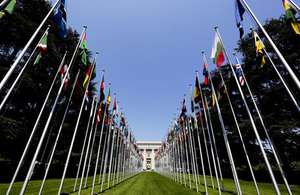UN Human Rights Council 41: trafficking in persons and violence against women
The UK highlighted how it was tackling gender-based violence and called for more to be done to re-integrate survivors of trafficking into society.

Thank you, Mr President,
The United Kingdom welcomes this interactive dialogue and commends the work of the Special Rapporteurs on Trafficking in Persons and on Violence against Women.
We are grateful for the report by the Special Rapporteur on Trafficking, which concentrates on the long-term needs of victims of trafficking. The care of survivors and their re-integration into society are key to ensuring the sustainability of efforts to combat modern slavery. Furthermore, promoting their economic empowerment and ensuring access to education are important steps to achieving social inclusion and reducing vulnerability.
How will the Special Rapporteur on Trafficking ensure that there is a coherent message across the UN agencies to help address these points?
Turning to the Special Rapporteur on Violence against Women, we welcome the discussion on this issue. Violence has significant and lasting impacts for the achievement of gender equality worldwide. The UK is at the forefront of international efforts to eradicate violence against women and girls in all its forms, including: intimate partner violence; sexual violence; female genital mutilation; and child, early and forced marriage. We work with all partners to ensure women and girls are protected during crises, particularly through our initiative on Preventing Sexual Violence in Conflict.
The UK’s ground-breaking programme on ‘What Works to Prevent Violence’ has demonstrated that violence can be reduced by up to 50% in less than 3 years. We encourage others to make use of this evidence, which will enable us all to improve our efforts to prevent violence.
How can the UK work with the Special Rapporteur on Violence against Women to promote the evidence from ‘What Works to Prevent Violence’?
Thank you.